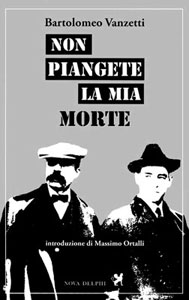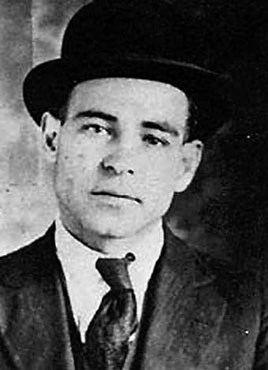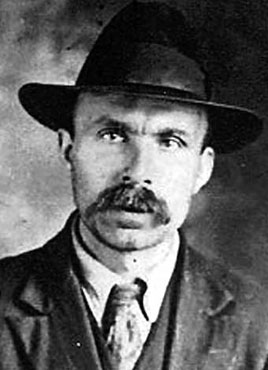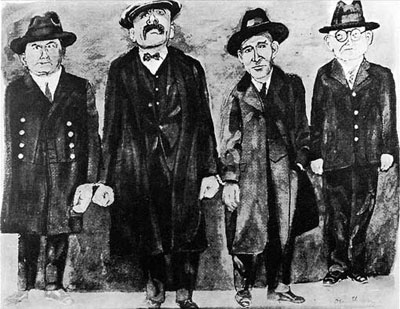 On April 15, 1920 four men on board a car to carry out a robbery in South Braintree shoe factory on the outskirts of Boston. After a brief shootout, remain on-site the bodies of the cashier Parmenter, who brings the money from the wages of the workers, and security guard Belardelli. They are hard days, those, not only in Boston but across the United States. The war ended recently with its tragic consequences, the social unrest of a proletariat strongly affected by the crisis, the new wave of immigration from far away and "barbarian" countries, disturb the sleep of the conformists. In a climate of witch-hunt, which sees the presence of of Slav and Latin immigrants and subversive of every color the "cancer" that threatens to destroy the "healthy" American society, the investigation of the robbery, carried out by police chief Michael Stewart Strongly ill-disposed towards foreigners, however, well determined to "pay the Italians and subversive to their arrogance", are addressed without fail on the environments of Italian anarchists. A place of rest, particularly active in those days, in turmoil, from the Atlantic to the Pacific, the watchwords of the rights and dignity of work.
On April 15, 1920 four men on board a car to carry out a robbery in South Braintree shoe factory on the outskirts of Boston. After a brief shootout, remain on-site the bodies of the cashier Parmenter, who brings the money from the wages of the workers, and security guard Belardelli. They are hard days, those, not only in Boston but across the United States. The war ended recently with its tragic consequences, the social unrest of a proletariat strongly affected by the crisis, the new wave of immigration from far away and "barbarian" countries, disturb the sleep of the conformists. In a climate of witch-hunt, which sees the presence of of Slav and Latin immigrants and subversive of every color the "cancer" that threatens to destroy the "healthy" American society, the investigation of the robbery, carried out by police chief Michael Stewart Strongly ill-disposed towards foreigners, however, well determined to "pay the Italians and subversive to their arrogance", are addressed without fail on the environments of Italian anarchists. A place of rest, particularly active in those days, in turmoil, from the Atlantic to the Pacific, the watchwords of the rights and dignity of work.
Inspired by the incendiary pages of the "Subversive Chronicle" and "Gathering of Refractories, " the many Italian anarchists are one of the most militant vanguards along to employees in the Industrial Workers of the World, in bringing the attack on a capitalism without rules that do not hesitate to defend their privileges, using the most savage and murderous repression. On the evening of May 5, the shoemaker Nicola Sacco and Bartolomeo Vanzetti, a fishmonger, current individualist anarchists invoking the words of Luigi Galleani, were arrested on board a bus. Their initial statements, relating to the arrest and the fact that they were found armed with two guns are inevitably full of contradictions. The two, in fact, that night they were shooting into the homes of their friends to retrieve and to make it disappear propaganda material so incriminating that they can send owners to prison. On this initial misunderstanding, caused also by their understandable insecurity in a country animated by the most heated xenophobia and lack of knowledge of Nicola Sacco, will create the frame that will take them, after seven years, the electric chair.
 Andrea Salsedo, as Giuseppe Pinelli
Andrea Salsedo, as Giuseppe Pinelli
We are following the Bolshevik Revolution, and belongs to that period on the climate of subversion fury that drives the North American institutions, terrified at the edge of paranoia, the possibility of the possible spread of communist fever in their country. Are common in neighborhoods, punitive expeditions led by a particularly aggressive police, characterized by the brutal devastation of the environment, transmitted to the unwitting victims of terror, indiscriminate and unjustified arrests against young boys stumbled in searches. And it's always those dramatic days of the assassination of the printer, anarchist Andrea Salsedo, hurled from the tower of the New York police after a violent interrogation, turned to him to denounce the authors of the publication of a leaflet urging the social rebellion. Leading companies in the Boston police, the justice minister Palmer, a character that will have a decisive role in thwarting the faintest semblance of a guarantee in the course of several prosecutions against the two Italian anarchists.
After an initial process in which the dock only Vanzetti, sentenced from 12 to 15 years for a robbery never committed to Bridgewater on April 24, 1919 - thanks to the dishonesty of the lawyer John Vahey that soon will be co-opted in prestigious prosecutor Frederick Katzmann study, famous for having commented on the indictment with the significant phrase, "I have arranged the two bastards for the parties"- May 31, 1920 begins the process for robbery in South Braintree, which ended on 14 July with the sentence to death. The two anarchists are defended by Fred Moore, habitual defender of the militant Industrial Workers of the World, specially chosen by Carlo Tresca, an anarchist in New York from Abruzzo and editor of the anarcho-syndicalist tendency of "The Hammer. " Understandably, and added even courageously, Moore sets the defense more on political than on strictly legal. An attempt generous, but unfortunately that will prove counterproductive.
 |
Nicola Sacco |
 The rejected appeal
The rejected appeal
Thus begins the long ordeal of the two anarchists imprisoned in Dedham, ordeal that for seven long years will see a continuous series of legal and political skirmishes now to affirm the adequacy of the indictment, now the blatant injustice that has marked the whole each case. They are very tough year for the two inmates, who in spite of their determination and resolve will be affected by deep depression, skimming the madness. Before Nicola Sacco is the victim, who will attempt suicide, after Bartolomeo Vanzetti. Where will most obvious design of a persecuting power willing to despise each rule, the two anarchists seem to lose, in fact, that lucidity which then will show the world the day of execution of sentence. To accompany their detention, however, will never fail a massive popular mobilization that developed not only in Boston and the rest of the United States but also in Europe and worldwide.
We will not, in fact, only the committees of the anarchists to fight alongside them, not just the libertarians from around the world to sympathize with their ideas and their drama, but in defense of Sacco and Vanzetti, motivated by a sense of justice above, will mobilize hundreds of intellectuals, lawyers, renowned scientists and scholars, who will not hesitate to denounce the plot hatched against the two innocent people. Among these is enough to recall Benedetto Croce, Upton Sinclair, John Dewey, Maxim Gorky, Sinclair Lewis, Romain Rolland, Bertrand Russell, H. G. Wells, Stefan Zweig, Ben Shahn. Nor should we forget the tireless work of the emilian anarchist Aldino Felicani, leader in Boston of the Defense Committee pro Sacco and Vanzetti, administrator of the funds that converged from all over the world for legal expenses and assistance to the family until his death tenacious guardian memory of two innocent men sent to the electric chair.
In 1923, in an attempt to give greater legal consistency and less political value to the whole affair takes on the patronage of Sacco and Vanzetti one of the first lawyers in the United States, William Thompson, a purely legalistic approach which leads the lawyer Moore to abandon the defense team. But all is futile. The desire to get to the exemplary sentence of two dangerous subversives, despite the gradual disintegration of the prosecution's castle, put into crisis by the heavily spontaneous declarations of guilt of the Madeiros and evidence in favor of members of the gang of robbers American Morelli of Italy, see also appeals in confirmation of the first sentence. In fact, 12 May 1926 is the ratification of guilt by the President of the Court Webster Thayer and April 5, 1927 is rejected as the last resort.
Even the intervention of Felix Frankfurter, one of the most famous American lawyers, which will become shortly after Supreme Court Justice, does not get a retrial. Even his famous indictment, The Case of Sacco and Vanzetti. A critical analysis for lawyers and laymen, which deals with the case from a legal point of view essentially flawless and considerations of legal process which aroused great deal of interest in revealing the shortcomings and irregularities, not only formal, in which Thayer Katzmann had led the process, can tarnish the will of persecution of the Court of Massachusetts. The same committee of lawyers at the highest level, appointed in the summer of 1927 by Governor Lowell, on whose authority and impartiality seemed you could count, while recognizing the many distortions of the proceedings, confirms the appropriateness of the sentence. So on January 12, 1927 rejecting the appeal and last April 9 of that year he issued the final ruling of death sentence. The governor of Massachusetts, Alvin T. Fuller, promptly approve the verdict and reject the grace and the sentence will be executed by electric chair of the Charlestown prison, despite the massive public demonstrations of protest, on August 23 of that year.
 |
Bartolomeo Vanzetti |
 Long and epic battle
Long and epic battle
As is becoming increasingly clear, the story of Sacco and Vanzetti is not past history, but is contemporary history, history of today, very topical. A story that foreshadows, and play them back, some of the dramatic contradictions that today through our country. And it is significant that the state violence that hit two people just because anarchists and immigrants is almost identical, except in the form of course content, in what is now the European democracies are falling on the shoulders and on the lives of other immigrants, other proletarians, other enemies of the established order.
The tragic incident that involved a Boston saw Nicola Sacco and Bartolomeo Vanzetti, convicted and wrongfully executed in the electric chair, can also be called a great battle for civilization. And freedom. What, according to the justice of the State of Massachusetts, should have been only a court case, neither more nor less than many others who saw the dock immigrant proletarians, subversive, turned from a black news story on an epic and a long battle that saw arrayed on the one hand the free consciences and civilians throughout the world, some other state officials, both filled with prejudices and biases that are determined to ensure that these prejudices and biases could become the basis for a "exemplary" sentence. In fact, the membership of the two defendants with the most radical of the Italian-American anarchist, their refusal, during the war, of failing in its anti-militarist convictions and the consequent decision to defect and repair in Mexico, and the reactionary wave that arose created after the success of the revolution in Russia, led to the climate that accompanied the story making the inevitable shameful outcome.
It was only for the firm in their ideas and the moral dignity with which the two defendants faced their fate, despite the intentions and expectations of their accusers, that this case could take time, and still plays, a particular importance: a case study of how an attempt at retaliation and revenge against those who dared to put the institutions in question the legality could become a deadly boomerang, which led to the dock, facing the whole world, and a part of a reactionary justice culture, steeped in suspicion and prejudice. Suspicion and prejudice, against the alien and different, that even today we find so often in the folds of a society that we would open and tolerant.
Despite the decided claims of innocence, the endless tests that exonerated them, accusing the obvious excesses and illegalities of procedure, the American justice system would assert its right to condemn, in the people of the Sacco and Vanzetti, which could challenge its legitimacy. That run, therefore, was not the intent of prosecutorial excess at the very limit, but the effect, tenaciously sought and obtained, the desire of American institutions to prevent them from mining the sacred principles of its founding fathers. A clear injustice committed by a society deaf to any sense of humanity and determined to trample even the postulates laid down in the American Revolution.
 |
Ben Shahn: Sacco and Vanzetti between guards, 1932.
Private Collection |
 In the collective memory
In the collective memory
Only in 1977, Governor of Massachusetts Michail Dukakis, urged by those who sought justice for the two Italians, will decree that the process was not conducted properly and in accordance with the rules, how deeply influenced by racial prejudice and political and intellectual dishonesty and proclaim the day of 23 August as "Sacco and Vanzetti Day".
From then on August 23, 1927, moreover, the memory of the two anarchists has never failed among their peers and among those who did not want to forget the injustice of power. The ponderosa bibliography on Sacco and Vanzetti and the numerous initiatives devoted to them are evidence of that tragedy is still fresh in our collective memory. And if in the anarchist periodicals of this post-war has never failed the memory and executing the reconstruction process, even among those who feel the need to uphold the principles of solidarity and equality among peoples, the story of Sacco and Vanzetti did not cease to provide an opportunity to reiterate that it is necessary to keep these principles alive.
Very timely, then, is the repetition of words with which Sacco and Vanzetti accompanied their tragedy. In statements and letters collected here, which saw a first edition in France in 1931 under the auspices of the International Committee, you can find, in fact, the spirit and the strong position of humanity with which the two anarchists were able to face their fate: not the resignation of the sacrificial victims nor lament, but that was understandable, for the wrongs they have suffered, but the strong assertion of their ideas and their own life choices. Ideas of justice and freedom, lives dedicated to social emancipation. The thin autobiography, which traces Vanzetti with elegant style and dry the events that led him to seek new opportunities in America, especially given the extraordinary self-defense just prior to his conviction, are supreme examples of civil literary.
In the words of the Piedmontese anarchist pronunciation in front of the jury that his judge there is not only the claim of an ideal much too advanced for those minds darkened by prejudice, but there is also a description of a dream the same dream of extreme freedom, and conscious that other anarchists and working class militants, before him, had described in court today and, once again, it is worthwhile to know.

